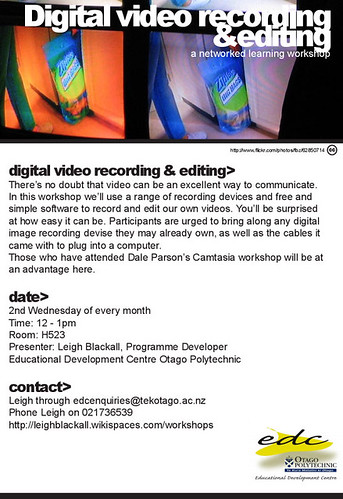 Since the podcast about podcasting session, there's been an increase in the number of people at Otago Polytechnic interested in audio recording and publishing. We had a few people at the Digital Video Recording and Editing workshop yesteray. Merrolee wanted to find out how to make her mobile phone recordings available online. Julia is interested in how she can AV record her presentations and make them available online. Rachel is interested in current trends in video for use in her photography classes. Phil turned up to get ideas. Bronwyn was there as well. Ken couldn't make it because of a meeting, but her is interested in audio recording and podcasting lectures.
Since the podcast about podcasting session, there's been an increase in the number of people at Otago Polytechnic interested in audio recording and publishing. We had a few people at the Digital Video Recording and Editing workshop yesteray. Merrolee wanted to find out how to make her mobile phone recordings available online. Julia is interested in how she can AV record her presentations and make them available online. Rachel is interested in current trends in video for use in her photography classes. Phil turned up to get ideas. Bronwyn was there as well. Ken couldn't make it because of a meeting, but her is interested in audio recording and podcasting lectures.Seeing as this was the first workshop on digital video, I kinda held the floor for the hour going over all the different things involved, and explaining what it doesn't involve - for me.
I started off explaining how this workshop fits in the series of workshops in networked learning, and how there is an eMail list for the participants to continue discussion before and after workshops. I showed how everyone is a manager in that eMail list and urged everyone to invite and add others. I also demonstrated how to RSVP a time for workshops from the workshop calendar.
Then I moved into what the session is about. I pulled out my little pocket camera and explained my perspective on these camera's video recording capabilities. For the most part these cameras do a good enough job in terms of quality for use on today's internet. The fact that they can only record short lengths of video is a blessing in my view. Like the expense of film, storage issues for digital cameras means we are more careful and thoughtful in how we shoot video. This naturally leads us into a practice of in camera editing, which in the long run is a very good practice to get in to.
From that I showed YouTube. One of many free DIY video publishing web sites that offers free streaming for your videos. I showed some of my uses of YouTube and demonstrated the extra benefits of using socially networked services like YouTube - especially how when you upload a video of your own, it automatically relates your video with other videos like it, based on how you describe yours. This can be a valuable feature that will save we teachers from "reinventing wheels", and networking us with other video creators with similar interests.
I showed how I am largely using YouTube for screencasting. I use the free and open source screen recorder CamStudio to record demonstrations of using particular websites and software. I then upload the demos to YouTube and copy the code offered by YouTube and past it in this blog to display the video in context, as such:
If you are reading this post in your email, then it is likely that you cannot see the video. The email has been forwarded from the original blog post. Click the "educational development" link at the bottom of the email to see this post in its original context.
I then talked about the limitations of YouTube only really being usable to people who have access to broad band Internet. Unfortunately, YouTube does not yet offer a feature of being able to download the video to play offline. What we need is a service that will at least allow people to set their computers to download a video file so that they can walk away and come back next morning and have a video file to play.
So I showed OurMedia. OurMedia offers unlimited file storage, non commercially. It is the contemporary media capture arm of the Internet Archive, an impressive project working towards the goal of offering universal access to all human knowledge.
But before uploading video to OurMedia, it is a good idea to process our orginal video into a size and format that is optimized for the Internet. I use the free video converter Videora. Videora processes videos into the MPEG4 format which is playable in the Quicktime player, as well as the iPod video player. It is generally accepted to be the most widely used and playable format.
Once original video has been processed into MPEG4, it can be uploaded to OurMedia, and then the Universal Resource Locator (URL or Link) is offered by OurMedia for you to copy and use in your online communications. That is the link that people on slower connection can use to save the video to their computer for viewing later.
We talked about a whole bunch of other issues and potentials in the workshop, but hopefully these notes cover the core elements.
Previous posts
- Survey for flexible learning development
- Terry and I went to Cromwell
- Podcasting about podcasting at Otago Polytechnic
- Wiki workshop
- Here we are in a Networked Learning workshop about...
- Setting alarm notification in Groupwise
- Essential listening: Brewster Kahle on universal a...
- Why OP learning content should be open and free
- Essential listening
- Del.icio.us
Archives
Educational Development is powered by Blogspot, Gecko & Fly and Otago Polytechnic.

This work is licensed under a Creative Commons Attribution 2.5 License.
0 Responses to “Audio video workshop”
Leave a Reply